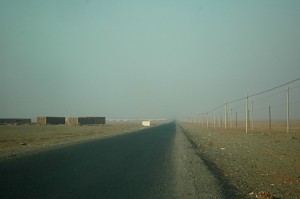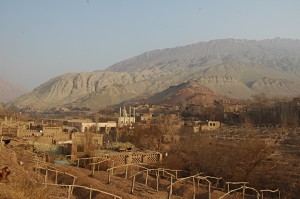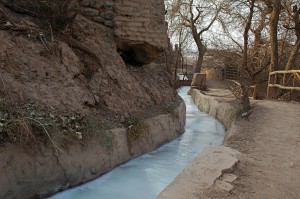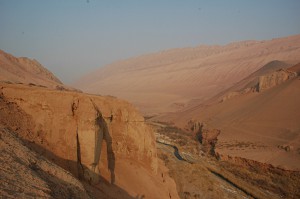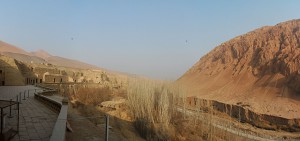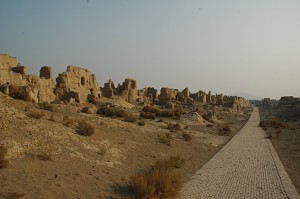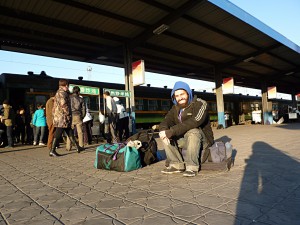After my first experiences around the Western part of the Takla Makan desert, some more were to follow in Turpan. The city lies in a very dry region far below sea level. The information one usually gets about the weather in the region is that temperatures reach about 50°C. Little is being written about winter in Turpan.
After our arrival, Tim and I packed all our luggage in the hotel room and we rested for a while. Sometime later we became hungry and started to look for an Uyghur night market. The Han-Chinese completey remodelled the center of the city such that nothing is left of the Uyghur traditions. We thus had to walk a few steps before we reached Uyghur looking streets, which could possibly offer a night market.
Unfortunately there was no night market to be found. We finally stepped into a large restaurant where many people were sitting and music was playing. We were stopped right at the door and the fellows explained to us, that this was a wedding and of course we were invited in to joing the merry crowd. They pointed us to a table where already some young men were sitting.
The locals immediately circled us and started asking questions about where we were from, where we were traveling and so on. Especially Ablim and Muhammad were interested also to meet again during our stay in Turpan. Thankfully we accepted their business cards and phone numbers.
After a few minutes the food started being served. The dishes on the table containing the food were stacked in three layers to fit everything on the large round table seating about 10 people. The were different kinds of meat and fish, rice and bakery and various kinds of salads. Besides the traditional tea, two bottles of liquor and a bottle of sweet lemonades were passed around. The two liquor glasses were always passed to the person next to the neighbor, such that there were always two new people who could have a drink. The guys did not seem very used to alcohol, why some of them ended up not being able to walk straight.
During the meal the music started and some dancers performed for the crowd. Later on the guests danced first to traditional, later to modern music. It was surprising to see that in that wedding, the boys populated the dance floor first. From what I am used to the boys are always the last ones to bring up the courage to dance.
Around 11pm the party was suddenly over and we headed back to our hotel. Our first duty was to sort out all the contact information we had gotten during the night.
Since Tim was still fighting his cold, I used Sunday to go on discovery by myself. From the reception I called Albim, whom I had met the night before at the wedding, since he had told me, that he had a friend who owned a computer shop. This was very convenient, since somehow the power supply of my netbook did not work anymore. I waited for about 20 minutes and when he showed up, we immediately left for the computer shop. It is a big advantage to have a local tagging along, since the consulting in the shops is much more honest and the prices much more reasonable. The repairmen thus first reached for a multimeter and checked the cable. This immediately showed the problem and I thus only had to buy a new cable and not the power supply.
When we left the computer shop Muhammad, Albim’s friend who was also present at the party the night before, joined us. We discussed the plans we had and talked about going on a tour to Tuyuq, a small village in the mountains around Turpan. Since I wanted Tim to join we headed back to the hotel. Finally we ended up spending a good part of the day in our hotel room discussing with the two of them using the Uyghur we knew, our hands and a lot of Google Translate. In the afternoon we called Ahmad whom I had contacted via CouchSurfing to meet us. Ahmad was an Uyghur person who taught biology and English and worked as a tourist guide in the summer. He could accelerate our discussion since he spoke fluently English.
The five of us thus talked in the small hotel room for a little longer. Especially Albim was interested how we could possibly make business. Unfortunately animal nutrition is not really my speciality. When Muhammad and Albim finally left, Ahmad first unplugged all the electronic devices in the room before he started telling us some stories about the Uyghurs’ situation in Xinjiang.
Ahmad was not the first one to tell us how difficulat it was to get a passport in Xinjiang. It usually only works at all, if the requesting person is will to pay between 2000 and 3000US$ of bribes to the officials. The passport itself only costs 250RMB, about 40US$. Another story he told was about the city center of Turpan. In the meantime the center is very modern and well kept and replaced the old Uyghur city center. The center covers an area of about 2 square kilometers. As soon as one moves from the center one arrives in the Uyghur parts of town, no matter which direction one chooses.
Ahmad joined us for a short tour across the market in Turpan, where he helped us organize a few things, before he left us for his evening prayer. I hope his dream about leaving Turpan with his wife will become reality anytime soon.
Since Sunday was a day with the local people I did not feel bad to use Monday for visiting some of the tourist attractions around Turpan. Since Tim decided to stay in bed I went out to find a ride for the day on my own. When we arrived from the train station we came by a central taxi station where all the drivers were hanging out. This is where I went first and immediately got involved into negotiating a good price. It was quite easy to achieve the wanted price, which of course once again left me wondering.
Our drive first led us to the small village of Tuyuq, a traditional village in the Turpan basin. While the temperatures almost reach 50°C in summer it was -13°C when we arrived there. The basin lays 154m below sealevel and is primarily known for raisins. The plain is covered almost exclusively be grape vines and about 75% of that harvest is dried to produce raisins.
Tuyuq sported quite a few traditional houses, a beautiful mosque and a frozen irrigation system. The latter gave the impression that I was looking at a bob run instead of an irrigation system. A little bit further into the valley there are several caves dug into the rocks. The caves were built by Buddhist monks in the 3rd century AD. Unfortunately it was not possible to visit the caves.
From Tuyuq we left for the Buddha caves of Bezeklik. The caves themselves were quite underwhelming except for the fact that I can claim I have seen more than 6000 Buddhas. The drive to the caves however was more than rewarding. The Flaming Mountains in which the caves are located consist of red rock and the gorge in between the mountains is impressive. There is also a small handicraft workshop which is, even though probably built exclusively for tourists, a nice sight.
From the Buddha cave we headed back to Turpan, first to fill up on natural gas for the car, for which I had to hide in the back of the car due to possible police presence, to secondly head out to Jaohe. The Jahoe ruines were for me one of the highlights of ruins I visited during this trip. Dating back to the Han dynasty (about 200 BC until 200 AD) the settlement provided homes for about 6500 people. Numerous walls are still standing several meters high and from the plateau in the North-West one can overview the whole sight very well.
On the way from Jaohe to the karez, the irrigation system in this desert, people at the road side were cutting a horse in piece. On one pile the head and feet were stacked, while on another pile they were cutting up the meat and the intestines. My driver bought himself some meat before we headed out to the Karez. The Karez are underground water channels, which reach the water carrying layer in the mountains and lead about 8 to 10 meters below the surface to the plantations in the plains. Every few meters there is a vertical shaft reaching down to the chanel. These shafts were dug out for digging the channel and for its maintenance. The Karez work of Xinjiang province work in the exact same manner as the ones for example in Iran, which is yet another prove of the information passing on the silk road.
Before the driver brought me back to the taxi station, he treated me for lunch to a delicious Laghman. However he way outdid me as far as speed and noise of eating are concerned. After the tourist tour I headed to the train ticket office to find the necessary information for the ride to Dunhuang, only to find out that there was neither a direct train nor a direct bus. Due to these transportation issues and the fact that Dunhuang offers many things which are better explored in the summer, I decided to skip Dunhuang and head directly to Jiayuguan, where the Western end of the Great Wall is located.
On Tuesday morning we enjoyed our hotel room a little bit longer than usual, before we headed out to buy the train tickets to Jiayuguan. This time we were well prepared, since we had found a website, which had all the information about the train connection in China. Unfortunately we were once again quite late for the ticket purchase, which is why we once again only got standing tickets. Since we already had some experience traveling on standing tickets, we saw no reason to worry.
We used the rest of the day for a stroll through some of the Uyghur parts of town to the Emim minaret, the tallest minaret in China. Even though the Uyghur parts of town are much dustier than the new Chinese town, they have a lot more character. The old buildings with the large courtyards, which definitely reminded me of an oasis, can be found on the left and the right of the street. In between mosques can be found over and over again, one more colorful than the other. We ended up looking at the Emim minaret only from the outside.
Back in the city center, we stacked up on groceries for the 15 hours train ride we had ahead of us. From the bus station we took the minibus back to the train station, where the waiting room was already filled with many passengers. The waiting room contains one row of seats for each train. When it was time to board our train only a few people got up to go to the platform, which really surprised us.
When we arrived on the platform we were really shocked to see all those people getting on the train. The train already seemd full and we had a hard time getting on with all our luggage. Fortunately there is plenty of luggage storage room on these trains such that we could just put our bags on top of the bags which are already there. I immediately tried to get hold of a conductor in order to get an upgrade to a seat or a sleeper. Unfortunately no such luck this time. The chief conductor later passed by and confirmed that there were no free comfortable places left on this train.
Slightly despaired we stood in the aisle and waiting for the things to come. This was the first time during this trip that I regretted the choice for the means of transport and especially that we had taken the slow train. This train had the best schedule assuming that one has a bed to sleep in. The faster trains took about ten and a half hours while our train took almost 15 hours. But there was one thing that made this experience unforgettable. We were on the cheapest train in the cheapest cars which we shared with the migrant workers traveling back and fourth in China to make a living in the Eastern parts of the country while their families live in the Western parts. Contrary to us, most passengers were on the train for at least 40 hours or the full 57 hours it took from Aksu to Baoji, while our stint only took 15 hours.
Fortunately every now and then a seat became available such that we could sit either in one of the really hard seats or on one of the stools the workers had brought themselves. When hot water was available for dinner almost the whole car headed to the one end, where it was distributed, which caused a major commotion. The people went to fill up their thermoses with tea or to get water to prepare one of the instant meals they had brought on the train. It never got really quiet on the train, because everywhere people kept talking through the night or someone started watching a movie on their mobile phone. In the morning the car looked like it had been hit by a bomb. Bodies were all over the place and it was hard to find a place even to stand. At all the stops during the night only a few people had gotten on the train, but almost nobody got off. At least Tim and I had a chance to practice our Mandarin with the locals. Saying hello and counting already worked like a charm.
In the morning we were yearning the arrival at Jiayuguan. On the one hand side we were really tired, on the other hand wome of the passengers were really high maintenance. All details of my clothing were inspected in detail and one of the passengers wanted to keep the zipper of my warm sweater. Another fellow would just not stop staring at me the whole night. The most difficult to stand however was the perpetual passing of people. Only during very short periods of time nobody was shoving through the cramped aisle. The worst thing were the food trolleys which were passing through the carts despite them being full of people. The second worst were the conductors who of course also needed to do their work.
When we finally stood on the platform in Jiayuguan, we first had to relish the fact that we were out of this sticky atmosphere. A local asked us whether they could take some pictures with us before everyone said goodbye. We immediately found a city bus which brought us to the city center, where we found a hotel after an extended search. The search only took that long because we were really tired.
![[en:]The ruins of Jiaohe near Turpan[de:]Die Ruinen von Jiaohe bei Turpan](https://blog.oliver-meili.name/wp-content/uploads/2011/12/turpan.jpg)
